Note: This week’s newsletter is going to be discussing body image, disordered eating, diet culture, and other similar topics. If these are things you are struggling with and do not have the bandwidth to read about, please take care of yourself and click away. If you want to read, I promise it gets good. Just wanted to let you know what was ahead of us. Take care of your heart, friend.
Among the many things in life I thought I’d never be, top of the list was “a gym girl.”
It was just not for me. I have no interest in being a gym rat, a body builder, or one of those girls who has so honed every muscle group in her body that she might as well have been photoshopped. What would I do at the gym? How would I learn how to use the equipment? Wouldn’t it feel like a chore to go? How would I ever have the nerve to walk into a gym and act like I belonged there, alongside all those fit people?
And yet here I am, going to the gym 3-4 times a week, and loving it.
I wanted to write to you about the experience of getting here, of how it feels to show up for yourself when the shape of your body is different than the presumed “way a gym body should look.” Of how you can be wrong about yourself because of incorrect beliefs you have held about your body and its abilities. Well, incorrect beliefs I’ve held about my body and its abilities.
I don’t think we’ve really done a deep dive in these letters about my relationship with food, my body, and exercise. The general consensus for those of you who know me only through this newsletter is that I am clearly pro-eating well, and body neutral/body positive. Those who know me here and on Instagram have read a little more of my thoughts on the matter and know that I am strongly anti-diet, and that I have a lot of thoughts about our food and our bodies. I think it’s holy ground we are walking here, in these conversations. But I don’t know that I’ve ever clearly shared how I got here.
Here are some things that are true about my story:
I have never had an eating disorder BUT
I have practiced disordered eating (restriction, assigning value to food, “making up” for “cheat days,” going on “shrinkage plans” - thinly veiled diets for alleged health - etc.)
I have PCOS - a hormonal and metabolic disorder that involves a lot of things like intense insulin resistance-led sugar cravings, insane hormonal dis-regulation, and a tendency to quickly and inexplicably gain weight without changing a single eating or movement habit.
I was raised in a family with the genetic makeup to be not-small. We are all hearty people. And while some of us are hyper-fit, none of us are tiny, frail, willowy, etc. I like to say you could shrink-wrap my skeleton and it would still have hips.
I have worked really hard to understand how to support my body, while being ultra-frustrated (at times) by how it is failing to respond. More on this later.
I grew up in a household that had a generally positive association with food. My mom always reminded us that “diets don’t work,” meaning, of course, that the diet cycle is not a permanent fix, and will only keep you trapped in an on again, off again cycle. We did go through occasional phases of health-food trends (an early experiment in TVP sloppy joes convinced me that vegan proteins - in the 90s - were disgusting), raw foods, milling our own grain for homemade bread, etc. and lived largely in what is now being called “an ingredients household.” So yeah, the snacks at hand weren’t really snacks; they were chocolate chips, the younger siblings’ graham crackers, lots and lots of date balls. My dad liked to say that food shouldn’t be connected to feelings (I think that this was more a “don’t eat your feelings” statement, but I disagree with the idea that food cannot have emotional/comforting effects. It can and should). But over all my love of food and rich culinary heritage, and of considering it a key component of the greatest times, was built at home. I really appreciate the fact that my family never shamed each other about food choices, never employed “diet speak” and never focused on losing weight.
By the time I was 12 years old, I looked like a full-grown woman, constantly being mistaken for my youngest sibling’s mother. I shot up tall, curvy, plump, and stayed that way. I have a memory of constantly feeling bigger than everyone else. So many of my friends took years to reach adult sizes, and there I was shopping as a pre-teen in the women’s section. I was probably a size 12/14, but felt immense. Social media didn’t exist then, and I didn’t have access to magazines or most other types of material that were showing me the ideal, skinny, leggy woman with the impossibly flat stomach. But I saw them anyway. In grocery store ads, the newspaper, the copy of Reader’s Digest in our downstairs bathroom. Some of those images so seared themselves into my memory that I can still see them today: the Yoplait commercial where an already-slender woman hangs a bikini on her closet door and eats presumably nothing but Yoplait yogurts for weeks until she finally goes on vacation, successfully skinny and supposedly happier for it; or the inserts in the newspaper showing a middle-aged woman with a measuring tape held around her waist, or standing in one leg of her pants and holding out the other side to show you - the ought-to-be-horrified viewer - just how much superior of a life she has now that she doesn’t need two legs of her jeans; or the giant newspaper spread about a bunch of people who lost weight (how is this a headline?) with a boldly typed Kate Moss quote: “Nothing tastes as good as skinny feels.” (Bullshit. Cook anything from this newsletter and you’ll see how wrong she is.)
I don’t need to go on - anyone who has known what it is to feel inadequate in their body has seen these kinds of things. I felt a sense of relief when my sisters grew up and also had curves, and more relief when I made friends with a family of girls who had bodies of varying shapes and thought of their curves as an asset. For a while, things were excellent. Social media happened. I started a cooking blog. I found that I was really, really good at food, at baking, and that I wanted no part of a life where entire food groups were vilified. I diversified the friends surrounding me, realized that there is a lot more to life than worrying about your body, and started dressing the way I enjoyed dressing, finally abandoning rules I’d toyed with like “don’t wear horizontal stripes.”
It was around this point that I realized I wanted to incorporate movement into my life in a more intentional way. I took long walks down country roads near where I lived, tried some weird, niche exercise DVDS (T-Tapp, anyone?), and played Blogilates videos on my laptop while I sweated on a yoga mat. I enjoyed the movement well enough, and it made me feel good, like I was taking care of myself. I should do more, right? Like, maybe for vague reasons labeled as “health”, I should rethink eating gluten and sweeten things only with maple syrup? Here is the issue: the way I ate was already nourishing. Classic “clean up your eating” moves like adjusting a majority diet of fast food, prepackaged snacks and dinners, copious amounts of soda, etc. were not the way I ate in the first place. But since I wasn’t slender, that surely had to mean I was eating poorly. I believed this idea, and it led me to ridiculous adaptations of my diet in an attempt to cut out enough food groups to hack the reason I still had generous curves and soft arms.
This was the “no flour, no sugar era” of my early twenties. I would go paleo for a little while, then drift back to normal eating, then hit it hard with a Whole30, then settle into a rhythm that “worked” for me, which is to say cutting out what I perceived as the twin evils of the modern world: flour, and cane sugar. No breads, pastas, sweets, or wheat-based grains. Heck, let’s just go low-carb entirely. This was the era of skipping breakfasts, and trying to silence cravings with avocado brownies, black bean brownies, more date balls, and flax seed crackers. I was dieting, but the “health” community made me feel like I was doing something great for myself. At this point, I was actually at my smallest adult-size, and did I feel better for fitting in a smaller jeans size? Absolutely not, proving that peace with your body is not dependent on size.

I was so confused. Though undiagnosed at the time, I struggled with PCOS symptoms. My intense cravings for carbs and sugar were, I thought, a lack of will-power. They worsened when I cut out most forms of carbs because (plot twist) turns out that your body needs carbs. I spent a lot of time feeling vaguely ill, a result of poorly balanced blood sugar. When I gained weight, I told myself, it was my own fault. I must be lazy, not working hard enough, not eating clean enough. I thought maybe I did have something hormonal going on like PCOS, and I tried to do a little research for how to take care of myself if that was the case. I was new to it, and the advice was so conflicting, so complex. I have a lot of grace for myself in this era because it wasn’t all bad. This period was my first experiment with trying to figure out what sort of lifestyle made me feel at my best. Movement felt good because it was good. And although not subsisting off flour and sugar alone is a good rule of thumb for managing insulin resistance, I was denying my body necessary carbohydrates of other kinds that left me hangry and meant that later - when my no flour/no sugar train derailed - I’d quickly gain weight because my body had, quite literally, been reading my restrictive eating as starvation cues.
Into this era, enter social media. I know that social media, for a lot of people can be an endless trap of comparison, “thin-spo,” and the place their body image gets totally ransacked. For me, it was actually a tool that helped speak life into me. I really, really am thankful for the types of accounts the algorithm served me back then, particularly on Instagram. After I’d been on Instagram for a few years, my feed was full of people who looked like me (or not like me, as I intentionally followed all sorts of people), who were speaking life over their bodies, and who were firmly entrenched in the body positive and body neutrality movements. It occurred to me around this time (my mid twenties) that my body was not a liability, it was…good? Beautiful, even? These people I followed made me realize that there is more than one way to show up in the world. That our physical forms are as varied and vivid as the rest of creation. That you can be fat and gorgeous, or skinny and gorgeous, or somewhere in between and gorgeous. That gorgeousness is not a prerequisite to being awesome. That there was a world of people who said no to playing diet-culture games, to restrictive eating, to speaking demoralizing things to their own bodies and other peoples’. That there was a reality wherein I could trust my body’s voice, rebuild my trust around food, and live free from shame. That “big” did not automatically equal “unhealthy.”
The more I entered this world, the more boldly I lived. That isn’t an exaggeration. My body suddenly became a side-note rather than the main focus. I wasn’t trapped in an outsized, unlovable form like some kind of nice Ursula. I was beautiful, desirable, funny as heck, and really smart. And I liked it here. Furthermore, I really enjoyed helping other people live in similar freedom. I started writing about our bodies and our relationships with them, and the more I wrote, the more I watched friends get to the same “AHA!” place with me and that feeling of seeing women breaking free? It lights me up. It is one of the things I like best in all the world. Women like Jess Connolly with her incredibly important book Breaking Free From Body Shame were voices I could trust that preached caring for our bodies out of freedom, not shame. The entire lens through which I viewed my body changed, and with that change brought so much delight in being.
I think it’s important to note that I had not lost weight during this time. I had actually gained weight and was living in the fullest figure in which I’ve existed. My freedom was not measured by pounds lost or some health kick, but from a true and sustained belief that my body was and is created with intention and is therefore good.
Eventually, I met Andrew and let me just tell you: to be partnered with someone who truly sees your beauty is a gift. He has always been a supportive, affirming voice in my life and I am so blessed by that. I know that some people are not in this position. I remember overhearing a woman at my church at the time say to someone, “I had to look this way catch him, I have to look this good to keep him!” and I swore in that moment that I would never be with someone where that was the dynamic of our relationship. If you know Andrew, you know that he is the opposite of this type of man.
As I moved through this growth, I was delighted and freed up by the idea that it didn’t really matter what my body looked like. What mattered was how I was able to show up, and how my body showed up for me. I celebrated the million silent, complicated things our bodies do each day with so little thanks. And while I still celebrate those factors, I had more learning to do. I had levels of ability-worship to dismantle. Some people like to scoff at terms like “ableism,” but that was a mindset that I was holding on to. The truth is, peace with your body cannot be based off of its abilities. Those abilities can be taken away, change over time, or not exist at all. To say “my body is good because I might be chubby but I can hike ten miles” is all well and good until a knee injury, or Lyme disease, or depression hits.
In my case, my body was good…until it denied me the thing I wanted most in the world.
In October of 2021, six months married and fresh off a PCOS diagnosis, Andrew and I began to try to expand our family. We knew that with my various health conditions the journey could take a little while, but I’m one of nine kids - strong fertility genes, right? Nearly two years later we are still without a baby. We are still trying, still hoping and praying.
There is so much here, so much that I do not have the words yet to write publicly about, but just know this: the past two years have rebuilt my relationship with my body from the ground up. If you are someone who wants to be a parent (and particularly someone who wants to be a mother), you might understand how it feels to have your body fail you again and again and again. There is no more broken feeling I have ever experienced. And yet, I still chose to believe that my body is good. It was time to put that belief to the test…
If I really believed that my body was good, then I would care for it tenderly, gently, and compassionately while it struggled. If I really believed that my body is good than I would take it to every doctor appointment it needed, and advocate for myself when a doctor was making incorrect assumptions or failing to listen. If I believed that my body was good I would be consistent in taking medications and supplements to help balance my hormones, feed nourishing food to it, move it in joyful ways, be patient with it, and above all: I would not step into the offer to loathe this good body, as tempting as that could be. Even if it seemed at times - as it has - that nothing I was doing was changing things for the better, I would speak life.
The past two years have been all of this and more. Andrew has been the absolute best partner in the process. Infertility is hard for both husband and wife. As PCOS is our primary factor, his hands feel tied by being unable to do much to help. Further complications in my health arose that - for now - rule out pursuing fertility treatments. And boy, does time move slowly when you’re watching dozens of surrounding couples in your life conceive, spend nine months pregnant, give birth, raise a baby, and sometimes conceive again while we wait, feeling like there is nothing more we can do. We sometimes cry together, and sometimes get fancy ice cream together, go through the occasionally-grueling experience of a baby shower together, and sometimes do arm-day at the gym together. And we are making it through with hope, by the grace of God.
Two weeks ago, I walked into the gym as a cardholding member for the first time in my adult life. I’ve been enjoying all kinds of movement for the past few years for the fun of it: yoga, walking, Pilates, and the occasional cycling class. The gym, however, was uncharted territory for me. I thought I’d be intimidated by all the “perfect bodies” and the vast array of equipment. I thought I’d feel like I didn’t belong there.
But I have something really beautiful to tell you: when I stepped into that gym I felt confidence surge up. Some of the confidence was borrowed from plus size women I follow online who have shown me that big bodies are fit too (hell yeah they are. I was quite fit, even pre-gym); some was borrowed from the incredible playlist burning through my Airpods (“Vitamins” by Qveen Herby is my favorite gym-jam). But the majority of my confidence was real, true, hard-won peace with my body.
When I encounter surprised looks, or respectful curiosity from my fellow gym-goers, it honestly doesn’t bother me, just makes me smile. Oh honey, you have no idea how strong I am, or what my life is, or how far I’ve come from playing into the idea that small bodies are the only good bodies.
The act of going to the gym feels great. Strength-training is a way of movement I have long been interested in trying, but lacked the time for until now. I love it. I’m sleeping well, getting stronger, and feeling engaged by the challenge. I enjoy the scavenger hunt of collecting reps and sets and then getting to move on to the next thing. It’s fun right now. And I’m really proud of the girl who was once tossing back handfuls of almonds and chocolate chips to keep from wanting a cookie, now enjoying the gym 3-4 times a week and living with no fear surrounding food.
Body neutrality, calling your body good, and caring for your body well are things that take daily effort. I still have hard days. I still have days where I see old pictures of myself and think, ‘‘I wish I my body still looked like that.” I still have days where I body-check other women and compare my memorized flaws to their obvious best points. And yes, the struggle to conceive still takes my breath away at the most sudden times with how sharply it hurts. But the good days outnumber the bad, and each blessing for my body builds a ballast that holds my head up in tough body-days.
I don’t know or care if I’ve lost weight through my workouts. I place my hands on my belly each morning and thank God for a body that maybe, one day, will have the ability to create and sustain life. I don’t call myself infertile; words have power, I’m done speaking harshly about this body. I cook excellent meals, drink enough water, and spend time outdoors. I sleep well. I bless my body when I see it in the mirror, or rub oil into my skin, or stretch my arms and legs when I lay down at night. I say no to all optional drama. I mind my own business. I have fun at the gym. I have dinner with my friends and family.
It’s a good day to live in this good body. This Thursday, July 20th, is my thirty-first birthday and it makes me happy that this subject of the week is one that feels like one of the realest things I have ever written. I hope you give your body some extra love today. Please pass along any recommendations you might have for your favorite squat-proof leggings, especially if you’re plus sized. And thank you for reading. Our time together is always a highlight of my week.
Love,
Rachel
P.S. It goes without saying, but I’ll say it anyway: due to the sensitive and vulnerable nature of these topics (body image, disordered eating, chronic illness, infertility) I ask that you refrain from giving advice in the comments, or critiquing any of the lifestyle choices I have shared or those of anyone else who shares their experiences in the comments. We are here to support and respect each other, most especially in these fragile places. <3
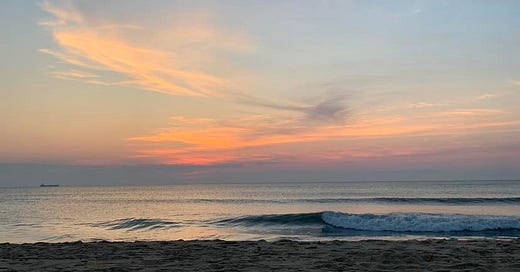



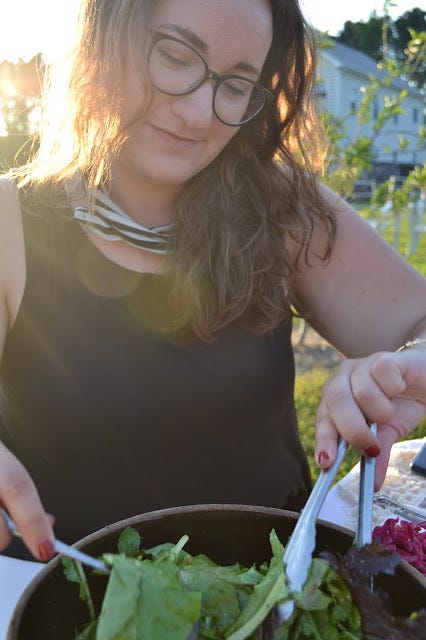
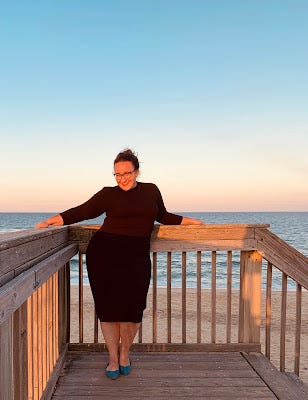
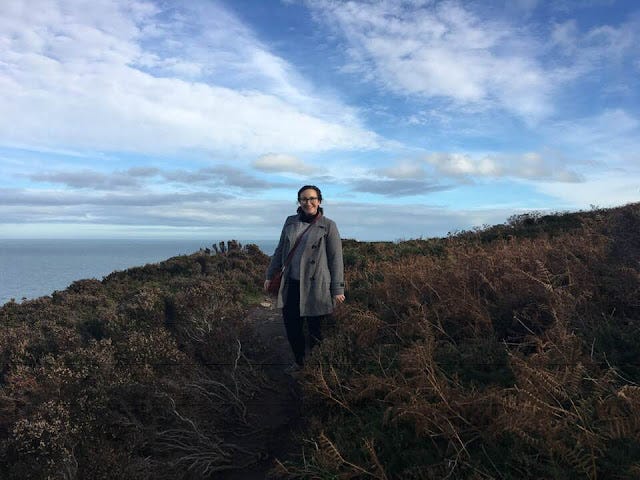
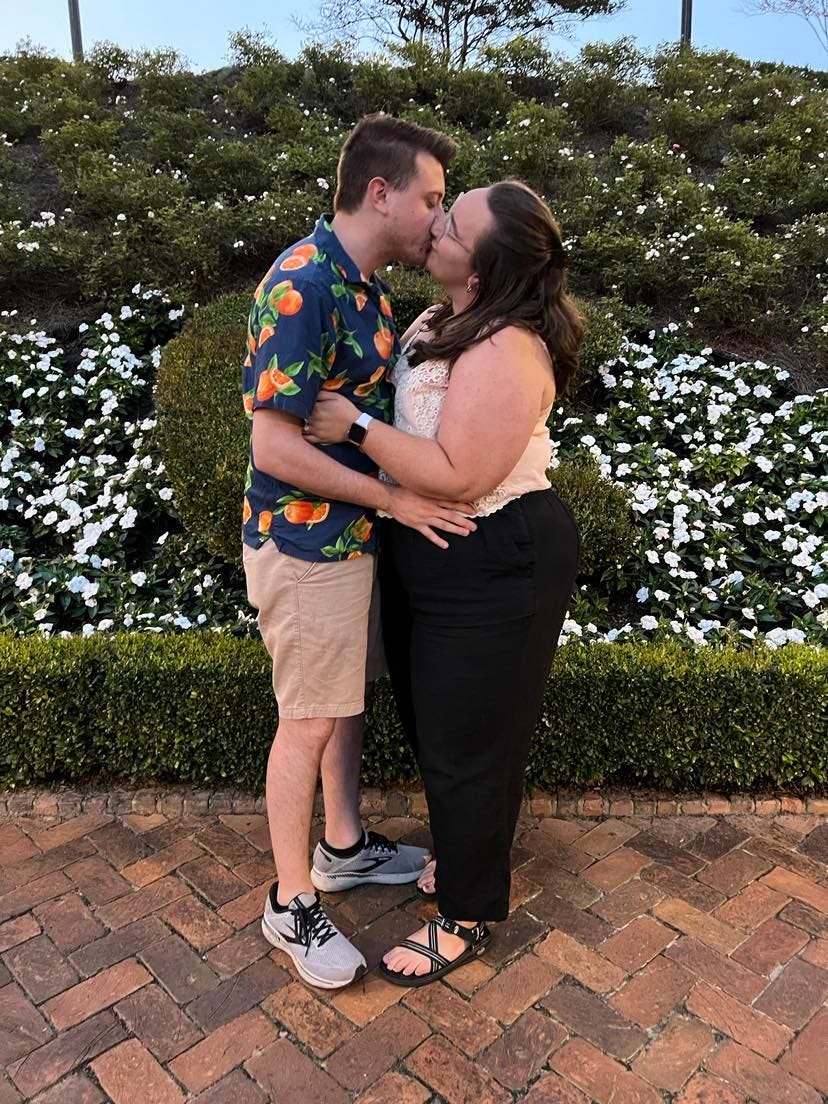
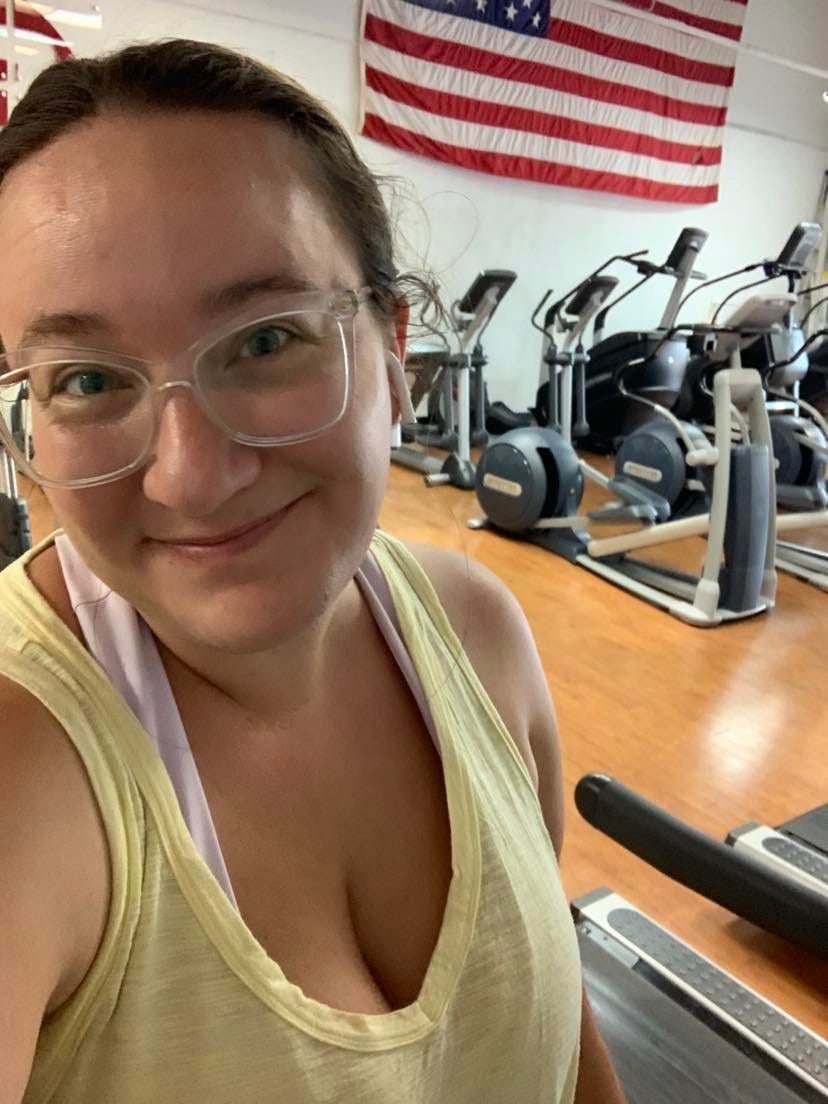
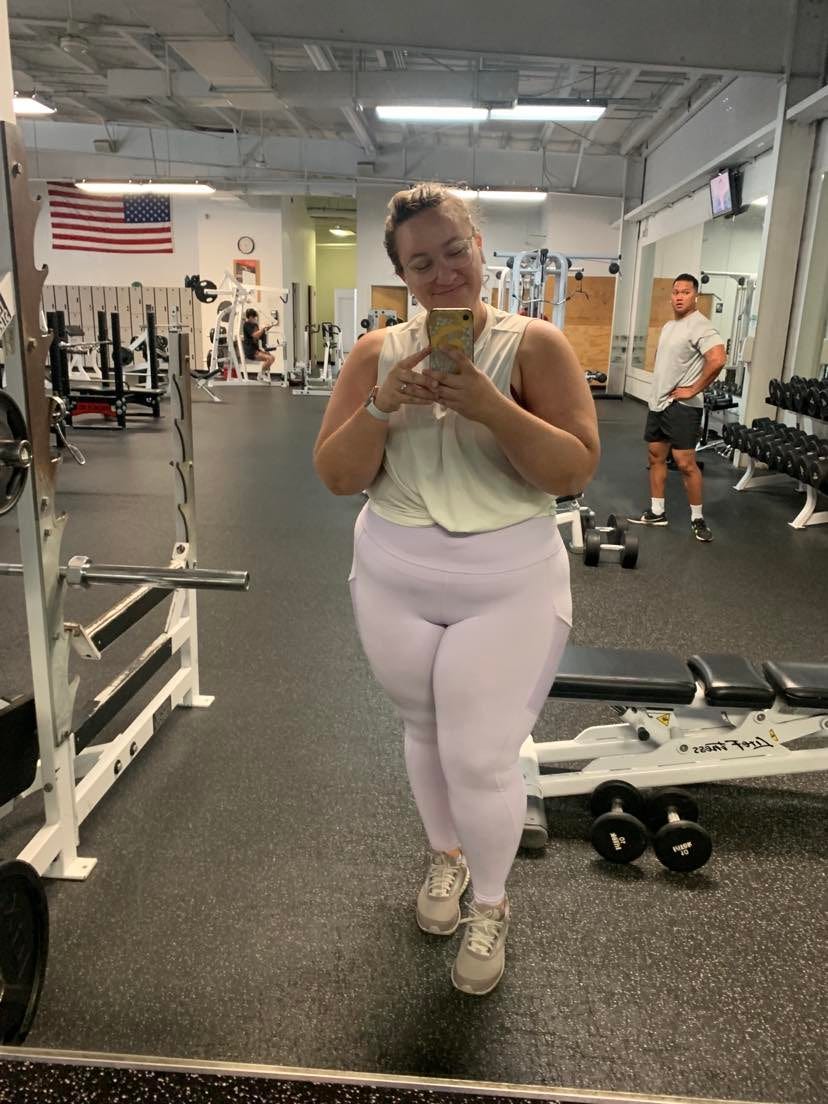
thank you for sharing these parts of your journey, Rachel! <3 you are a gift. praying that the comfort and peace of Christ would continue in your heart as you wait on Him in these deepest vulnerabilities. <3
Loved every moment of reading this and the truth it holds! 🤍